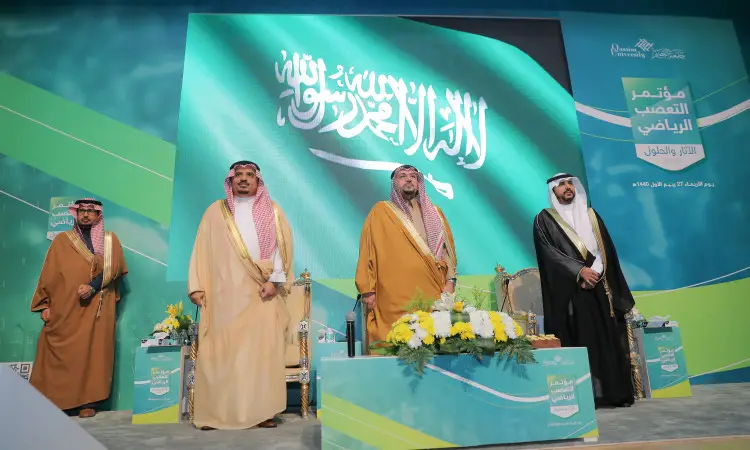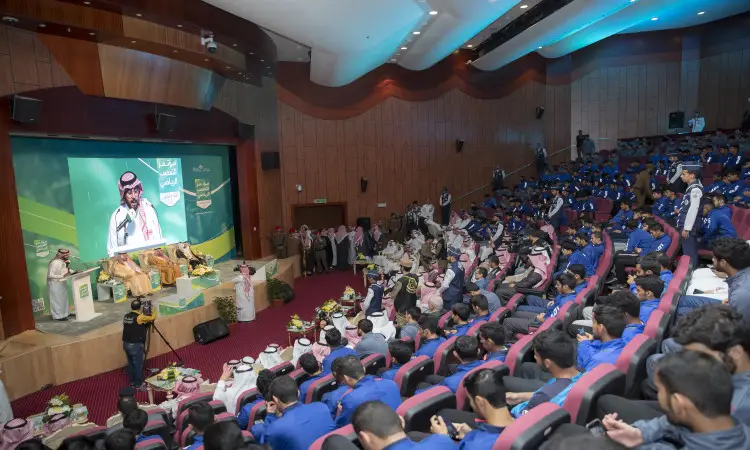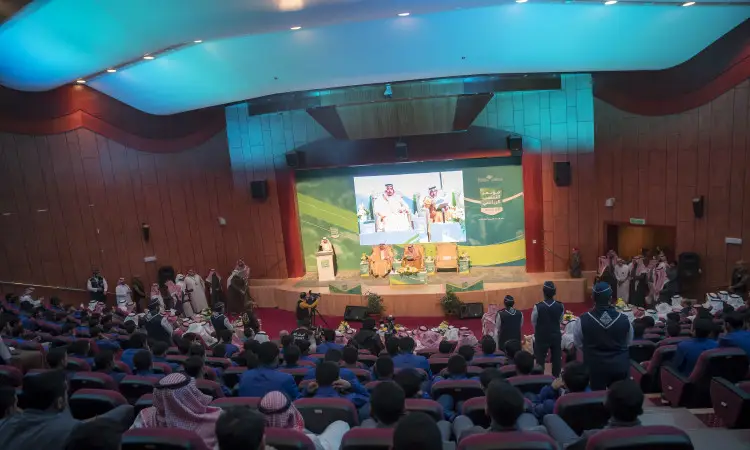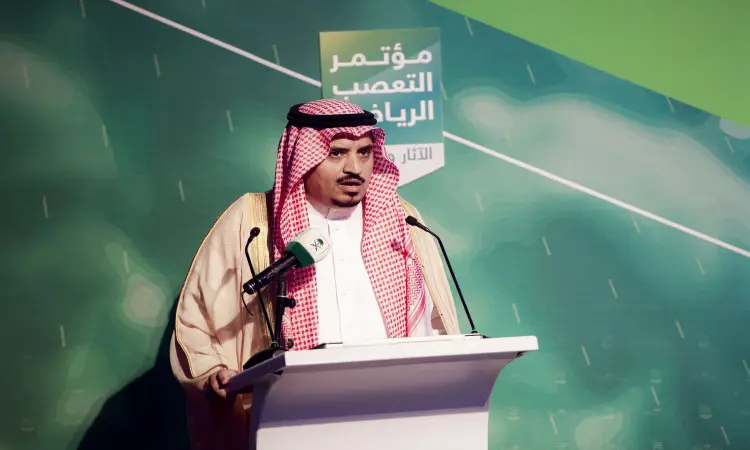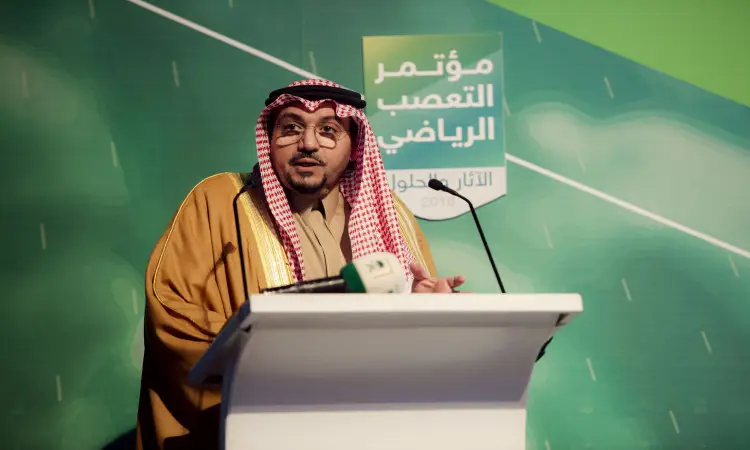His Royal Highness Prince Dr. Faisal bin Meshal bin Saud, Governor of Qassim Region, stressed the importance of sportsmanship among sports fans, club presidents and officials because this spirit makes them more accepting of everything, the most important of which is acceptance of the other party, pointing out that everyone can support a specific club but without antagonizing the other club, as we are all sons of one country and we are all loving and close families, and we should not antagonize each other for a match in any sport whatsoever.
His Highness expressed his wishes that the phenomenon of sports fanaticism will disappear during his speech at the opening of the conference "Sports Fanaticism ... Effects and Solutions" organized by the university represented by the College of Education on Wednesday, 27/3/1440 A.H. His Highness also expressed his happiness that Qassim University is proactive in discussing such a scourge and finding appropriate solutions for it, pointing to the responsibility of parents, club presidents and officials to set a good example for their children and raise them on the culture of sportsmanship. His Highness also expressed his happiness that Qassim University is proactive in discussing such a scourge and finding appropriate solutions for it, referring to the responsibility of parents, club presidents and officials to provide a good example for their children and raise them on the culture of sportsmanship.
H.H. the Emir of Qassim expressed his confidence that everyone will be on this approach and will stay away from tension, fanaticism and hostility to other clubs, pointing out the importance of the role of the region's clubs that have presented many initiatives to combat sports fanaticism and enshrine patriotism and love of the homeland, and this is something mentioned and thanked to the region's clubs whose tasks are not limited to sports aspects, but on national and social aspects, such as this forum, praising the working papers presented from inside and outside the Kingdom, praying to Allah Almighty to all success and success, and extending his gratitude to the University President Prof. Dr. Abdulrahman bin Hamad Al Daoud and all employees of the university and
For his part, His Excellency Prof. Dr. Abdulrahman bin Hamad Al-Dawood, President of Qassim University, expressed his pleasure in organizing a conference on sports fanaticism at the university and discussing this negative phenomenon from the scientific side, considering that this is one of the important roles played by the university towards sports, which has become linked to development in many fields, stressing that sports of all kinds have a fundamental and major role in supporting the development of our country, the Kingdom of Saudi Arabia.
Al-Dawood pointed out the importance of practicing these sports of all kinds in an atmosphere of familiarity, love, honorable competition and good morals, explaining that the phenomenon of fanaticism is a scourge that we must stop and identify its effects, talk about it, discuss it and write down its solutions, as he will seek to find solutions and proposals that help those involved in sports, and help us as scientific, educational and research bodies to limit this phenomenon, which cannot be accepted by our society, and we cannot stand by idly. The General Sports Authority and other clubs help the supervisory authorities to reduce this phenomenon, which cannot be accepted by our society, and we cannot stand by idly, so we must seek to find appropriate solutions to eliminate it. The General Sports Authority has sought to reduce this phenomenon with many programs, and we are participating with them to research the scientific and educational aspect of this phenomenon.
At the end of his speech, Al-Dawood announced that the University Council approved the transformation of the Department of Physical Education and Movement Sciences into an independent college that will see the light of day soon, thanking all the organizers of this conference, the participants from inside and outside the Kingdom, and all the media and attendees.
For his part, the head of the scientific committee, Dr. Sami Al-Sunaidi, Dean of the College of Education, explained that the government of the Custodian of the Two Holy Mosques paid great attention to sports and established sports clubs under the umbrella of the General Sports Authority, and was keen to open physical education and sports science departments in Saudi universities, and Vision 2030 focused on the importance of the role of sports and its place in creating a vibrant society and developing the next generation of young people physically and healthily in order to achieve the desired goals of the vision and increase sports awareness in various groups of society, but those interested in sports may stray away from its true meanings, which are represented in honest competition and competition.
Al-Sunaidi said that this conference aims to emphasize the role of sports competitions in promoting loyalty and loyalty to the homeland and employing sports games in raising the reputation of the Kingdom of Saudi Arabia regionally and internationally, as well as identifying the causes of sports fanaticism and its harmful effects on building a vibrant society, and spreading awareness of the importance of the role of sports in integration, social cohesion and solidarity between individuals, and the effects it reflects on economic, political and social growth. It also contributes to presenting ideas and proposals to reduce sports fanaticism and the means to curb it. Developing and promoting sports ethics in sports and community circles. The conference addresses several themes, the most important of which are the negative effects of this phenomenon on the development of games and sports in the Kingdom, the role of educational and educational institutions, sports clubs, relevant community institutions and regulations in raising awareness and reducing it, especially among sports fans, in addition to the relationship of the media and social media in increasing it, and the role of media codes of ethics and professional media honor charters in combating it and minimizing its effects.
Al-Sunaidi added that the fields of the various scientific papers that were submitted to participate in the conference after examination and arbitration by the scientific committee amounted to 24 papers in several fields, including sports, educational and psychological sciences, as well as in the field of sociology, in addition to sharia sciences, Islamic culture and regulations, where many researchers and academics from inside and outside the Kingdom participated, and the participants from outside the Kingdom were from the Arab Republic of Egypt, Algeria, Sudan, Iraq and Sweden.
The conference discussed several themes to address the phenomenon of sports fanaticism as follows: The first theme: The negative effects of the phenomenon of sports fanaticism on the development of games and sports in the Kingdom and its impact on their excellence and ability to compete locally and internationally, and the second axis: The role of educational and educational institutions, sports clubs and relevant community institutions in educating community members, especially sports fans, about the dangers of sports fanaticism and the importance of spreading sports ethics and fair competition between clubs and their fans, and the third axis: The role of the media and social media in increasing sports fanaticism, the role of media codes of ethics and professional media honor charters in combating fanaticism and its effects, and the fourth axis: The role of laws and regulations in reducing the phenomenon of sports fanaticism, and the mechanisms and procedures to ensure the activation and implementation of these laws and regulations.

